How to cure pinkeye quickly and effectively
Pinkeye , which is officially called conjunctivitis, is an eye irritation caused by allergies or infections. Our bodies can heal their own pinkeye, but you should take some measures to speed up the healing process, depending on what kind of red eye you have. Here are a few things to know about how to treat pinkeye quickly and effectively.
Part 1: Basics of pinkeye
1. Determine the cause of pinkeye.

Conjunctivitis may be caused by viruses, bacteria or allergies. Normally, pinkeye appears symptoms such as bloodshot eyes, watery eyes and itching , but other symptoms of the disease will change, depending on the cause of the disease:
- The virus can attack one eye or both eyes, and make the patient's eyes sensitive to light. Conjunctivitis due to viral conjunctivitis is very contagious and difficult to treat. It usually takes time to heal itself, and the healing time can last from one to three weeks. The best way to treat viral conjunctivitis is to prevent complications that may arise .
- Bacterial conjunctivitis often causes eye discharge, yellow or green, that occurs at the base of the eye. In severe cases, mucus can stick two eyelids together. This disease may appear on one eye or both eyes, especially bacterial conjunctivitis, which is often very contagious. To be able to treat bacterial conjunctivitis, it's best to see a doctor. In addition, you can self-treat the symptoms of home illness and antibiotics will help shorten the incubation period.
- Allergic conjunctivitis is often accompanied by other allergy symptoms, including nasal congestion or runny nose . When infected with allergic conjunctivitis, both patients' eyes will become infected. This form of conjunctivitis will not spread. Allergic conjunctivitis can be treated at home, but if the patient has severe allergy symptoms, immediate medical treatment is needed to quickly recover.
2. When to seek medical attention.

Calling a doctor to ask about your symptoms of pinkeye is not a bad idea, as the doctor will give you helpful advice on what you need to do. You should seek medical advice immediately if pinkeye is accompanied by some other dangerous symptoms.
- See your doctor if you feel pain or severe pain in your eyes, your vision becomes diminished and these symptoms do not improve as soon as you clear the eye mucus.
- If your eyes become dark red , you need to see a doctor as soon as possible.
- See a doctor right away if you suspect that you have a serious form of viral conjunctivitis, such as herpes simplex virus ( herpes simplex virus - HSV) , or if you have an immunodeficiency due to infection HIV or in the process of cancer treatment.
- See a doctor if antibiotics do not improve bacterial conjunctivitis after 24 hours.
Part 2: Treatment of home conjunctivitis
1. Use allergy medicine.
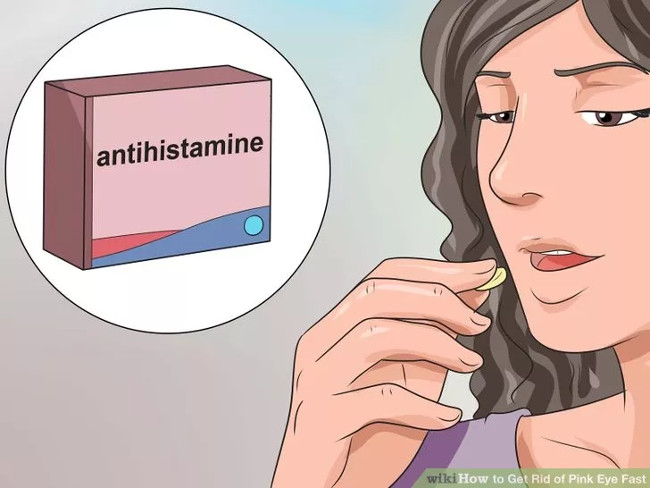
If you have mild allergic conjunctivitis, regular allergy medicine can help you eliminate these symptoms within a few hours to a few days. But if the symptoms don't go away quickly, you may be infected with bacterial or viral conjunctivitis.
- Try antihistamine (a drug that has an antihistamine effect). The body will respond to allergens by producing a chemical called histamine, which is the culprit causing pinkeye and other allergy symptoms. Antihistamine helps to reduce or completely block the body's production of histamine, thereby preventing red-eye symptoms.
- Use decongestants . Although decongestants do not help fight the effects of allergens, the medicine helps you control inflammation of the eye tissue.
2. Regularly clean the infected eye area.
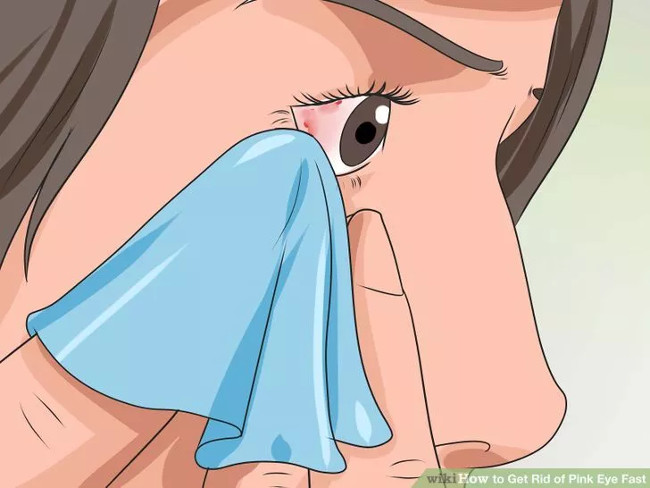
Whenever the eye appears fluid leakage , use a clean eye towel to prevent bacteria from causing pus to the eyes.
- Wipe the eye starting from the position of the innermost eye, next to the nose. Gently wipe the entire eye in a gradual direction towards the outer end of the eye. This will safely remove mucus from your tears and eyes.
- Wash your hands thoroughly before and after cleaning your eyes.
- Wipe your eyes with a clean towel or paper to prevent fluid from getting back into your eyes.
- Throw away a disposable tissue or eye towel, put a towel in the laundry container immediately after use.
3. Use eye drops (no prescription needed).

"Artificial tears" can relieve symptoms and help you wash your eyes.
- Most common eye drops are mild lubricants that come from saline that is used as a substitute for tears. Eye drops can relieve the symptoms of dry eyes caused by pinkeye and wash away dirt that can prolong viral, bacterial, or allergic conjunctivitis symptoms.
- Some over-the-counter eye drops contain very effective antihistamines in the treatment of allergic conjunctivitis.
4. Apply cold compresses or warm compresses.
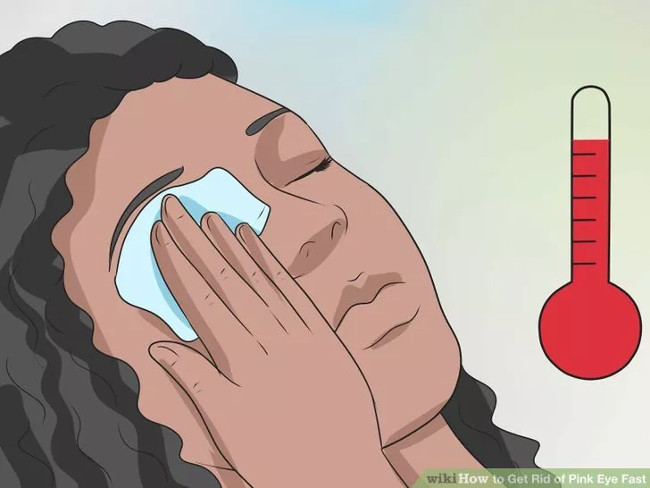
Soak a soft, clean towel, without getting dust in the water. After that, squeeze the towel dry , close your eyes and gently apply a towel to your eyes.
- The best way to treat allergic conjunctivitis is cold compressing, but warm compresses help you feel more comfortable and reduce swelling when you have viral or bacterial inflammation of the conjunctivitis.
- Note that warm packs may increase the risk of infection to the rest of the eye area. Therefore, you should replace the gauze after each use and use different gauze pads for each eye.
5. Remove contact lenses.
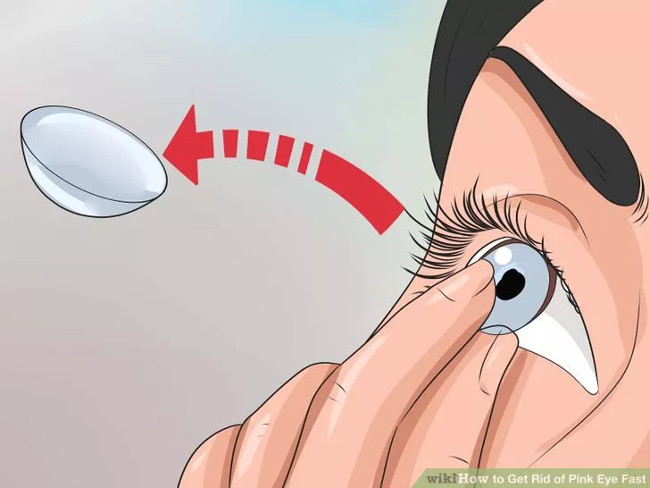
If you're using contact lenses, remove them as soon as you know your pinkeye. Contact lenses can cause eye irritation, making complications worse. Moreover, contact lenses can also retain bacteria that cause conjunctivitis in the eye.
- Disposable contacts can be removed immediately if you use them during bacterial or viral conjunctivitis.
- The non-disposable contacts should be thoroughly cleaned before re-use.
6. Prevent spread.
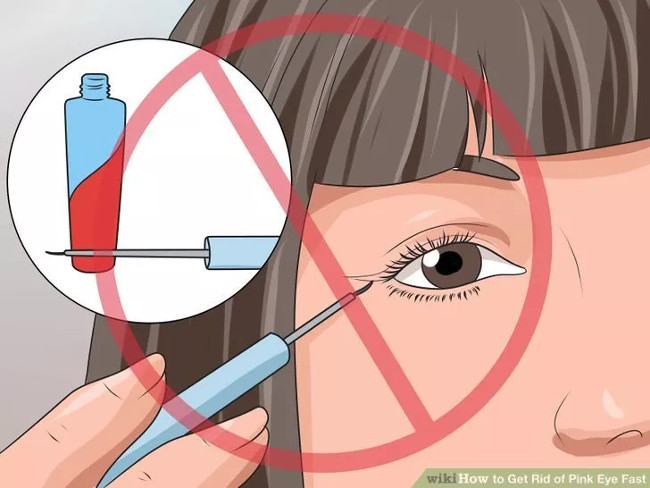
Viral and bacterial conjunctivitis are both highly contagious and you can be reinfected after you recover from the illness if it spreads to other family members.
- Do not touch your eyes. If you touch your eyes or face, quickly wash your hands immediately. Also, wash your hands after using eye medicines.
- Use a clean face towel and replace the pillow every day for the duration of the illness.
- Do not share any eye contact products, such as eye drops, face towels, contact lenses, eye cosmetics, contact lenses , glass cases or glass wipes.
- Do not use cosmetics on the eyes until completely cured because these cosmetics can make you re-infected. If you've ever used any cosmetic product when you have pinkeye, throw it away.
- Please leave school or take a few days off. Most patients, when infected with viral conjunctivitis, can go to school or work after 3 to 5 days, when symptoms improve significantly. Many people infected with bacterial conjunctivitis can go to school or work after symptoms disappear or 24 hours after using antibiotics to treat the disease.
Part 3: Treatment by prescription
1. Use eye drops as prescribed.
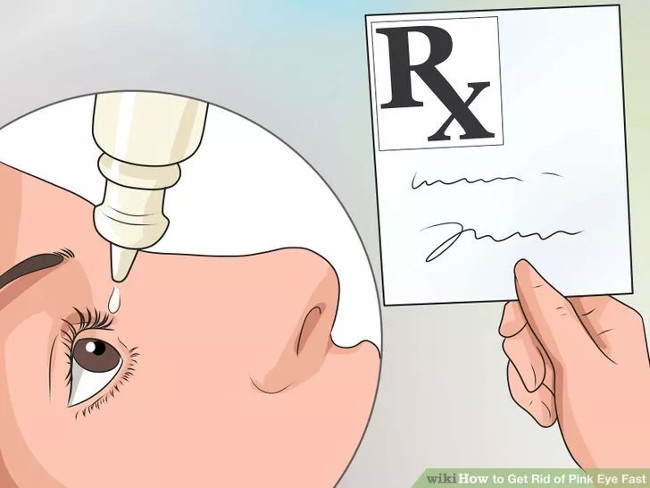
Although prescription-free drops can be effective for many people with pinkeye, prescription eye drops are usually powerful eye drops that help you get better faster.
- Treatment of bacterial conjunctivitis with antibiotic eye drops . Antibiotic eye drops are a treatment by directly attacking pathogenic bacteria. This medicine will help eliminate infection after only a few days, however, you can see the difference after the first 24 hours. Follow your doctor's instructions and read the directions carefully before using these medicines.
- Treatment of allergic conjunctivitis with antihistamine or steroid eye drops. You can buy some antihistamine eye drops without prescription but stronger drugs are only allowed to be sold with a doctor's prescription. Sometimes, severe allergic conjunctivitis can also be treated with steroid-containing eye drops.
2. Use eye ointment containing antibiotics.

Eye creams ( eye ointments) contain antibiotics that are easier to use than eye drops, especially when used in young children.
- Remember that eye ointment will blur the vision for 20 minutes after use . However, the patient's vision will be restored immediately after this time.
- If treated according to this method, bacterial conjunctivitis will go away after only a few days.
3. Learn about antiviral drugs.
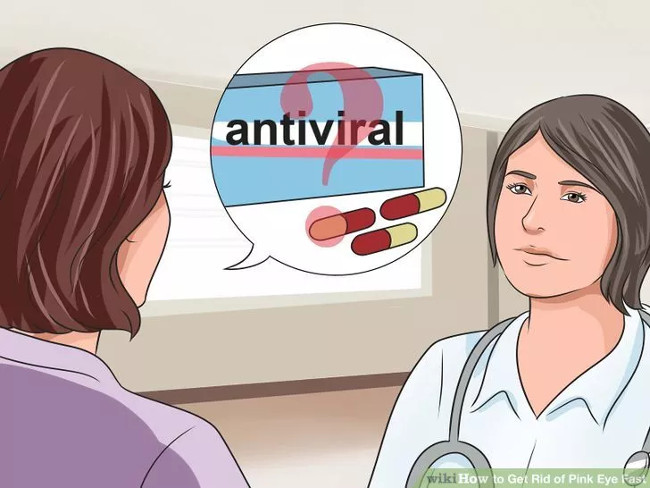
If your doctor suspects that your viral conjunctivitis is caused by herpes simplex viruses , they may decide to prescribe you antiviral drugs.
- Antiviral drugs are a good option even if you have experienced health problems, weakening your immune system.
You should read it
- ★ Experience in controlling gout is effective during treatment
- ★ What is allergic rhinitis? There is no cure?
- ★ 10 common diseases in children in the fall, symptoms and prevention
- ★ How to treat allergic rhinitis effectively at home
- ★ Eyes dark circles is a manifestation of what disease? Treatment of blurred vision at home okay?